#france during world war II
Photo
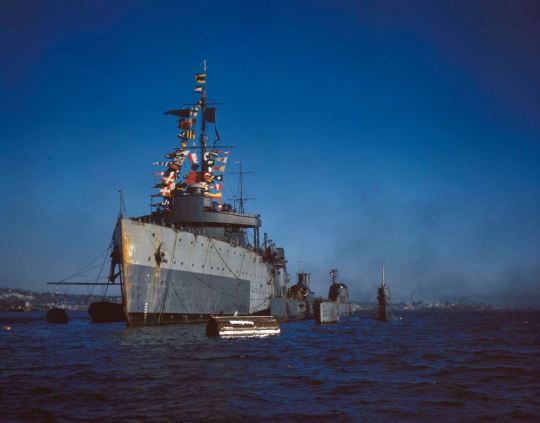
Free French Naval Forces sub Surcouf in Halifax Harbour (closest to depot ship) in 1941.
Here, Royal Navy Depot Ship HMS FORTH with the Free French submarine SURCOUF and two other Royal Navy submarines rest in Halifax Harbour. (Source)
#halifax#world war II#depot ship#royal navy#surcouf#forces navales françaises libres#croiseur sous-marin#la france libre#free french#silent service#submarine warfare#submarines#canada during world war 2#royal canadian navy
6 notes
·
View notes
Link
The Nightingale is a story about two sisters living in France during World War II. One sister, Isabelle, is a nurse and the other, Vianne, is a housewife and mother of two small children
0 notes
Text
TLT fans: did you guys know about the real Wake? I hadn't heard about her until we covered World War II in my world civ class this semester
Nancy Grace Augusta Wake (1912-2011) was a covert operative who was at the top of the Nazi's most wanted list in WW2, nicknamed "The White Mouse" for her ability to repeatedly evade capture. She was born in New Zealand with Māori heritage, grew up in Australia, and joined the Resistance after traveling to Europe and witnessing the harsh treatment of Jews in Vienna by the Nazis

Wake worked in the Pat O'Leary Line escape network until her Resistance organization was compromised by the Germans in 1942. After that she fled on foot across the Pyrenees—with several close calls that she escaped by flirting with German soldiers—and made her way to England to join the Special Operations Executive. She was part of a three person team codenamed "Freelance" which parachuted into occupied France. During this operation she got stuck in a tree after her parachute became tangled in its branches. The local Resistance leader who found her reportedly said “I hope that all the trees in France bear such beautiful fruit this year" to which she replied "Cut out that French bullshit and get me out of this tree"
While working in the Freelance operation Wake once biked 500 km (310 mi) without stopping in the span of 72 hours across Nazi territory to retrieve a new radio and codes after her team's were destroyed in a Gestapo raid. Without this feat, Freelance would not have been able to communicate with London and there would have been no more supply drops to support their Resistance organization. During the war she was also part of a raid which destroyed the Gestapo headquarters in Montluçon, in which she reportedly killed a Nazi sentry with her bare hands to prevent him from raising an alarm
Wake's fellow operatives described her as "a real Australian bombshell. Tremendous vitality, flashing eyes. Everything she did, she did well. She was an excellent shot, excelled at fieldcraft and put the men to shame by her cheerful spirit and strength of character." "She is the most feminine woman I know until the fighting starts. Then she is like five men." "We both came to the conclusion that she was 10 times the man I would ever be"
By the time of her death in 2011, Wake had been awarded the George Medal by Britain; the Medal of Freedom by the United States; the Médaille de la Résistance, the Croix de Guerre (x3), and the Légion d’Honneur by France; and the Badge in Gold by New Zealand. Due to a complicated relationship with Australia, she originally refused to accept any awards from the Australian government, saying that they could "stick their medals where the monkey stuck his nuts." In 2004, however, she accepted the honor of Companion of the Order of Australia as well
#the locked tomb#commander wake#awake remembrance of these valiant dead kia hua ko te pai snap back to reality oops there goes gravity#harrow the ninth#tamsyn muir#world war ii#world war 2#nancy wake#nancy grace augusta wake#rambling#idk what exactly to do with this information but i thought it was really cool#and let me tell you. the fact that commander wake seems to be based on a key resistance op in WW2 at the top of the nazis most wanted list#does NOT make john and his empire look good. in case we needed anymore hints#ww2 tw#nazis tw#herstory#nona the ninth#greatest hits
894 notes
·
View notes
Text
i learned that more boys are born during and immediately after wars, and no one knows why? The phenomenon is called the "Returning Soldier Effects". This effect is one of the many factors influencing human sex ratio.
The Returning Soldier Effect is a phenomenon that soldiers who returned from wars are more likely to father sons than other genders leading to an effect that during war times more boys than girls are born.
During a study conducted in 1954 by MacMahon and Pugh in the United States, scientists noticed that during the Second World War more boys were born than girls and that this effect can be seen in several countries participating in World War II like Austria, the US, Belgium, France, Germany, Denmark, the Netherlands, and the UK (only for Italy and Spain there was no significant change of the gender ratio). However, they were not able to come up with an explanation for this.
In their search for answers, the US scientists also examined the birth rates in earlier centuries and came to the conclusion that always during and after a war, more boys than girls were born.
There is no explanations for this “Returning Soldier effect.”
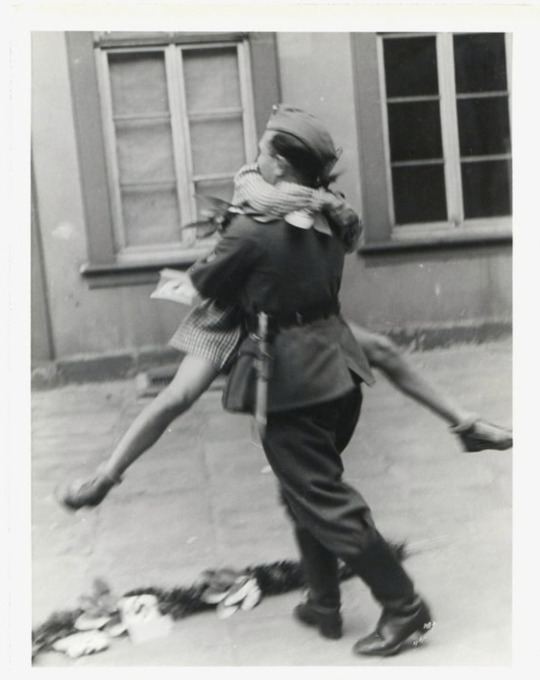
494 notes
·
View notes
Text
Friends, I have failed you all. I've seen a lot of posts over the last week with a lot of great biographical detail about many of the flyers and aircrew who've been name-dropped so far in Masters of the Air - and I haven't seen a single thing about the one name that is directly in the center of this blog's lane.
In Part 2, returning from their mission to Trondheim, Cleven and Egan walk into the Interrogation hut and Egan accepts a cup of coffee from a woman he thanks as Tatty. Later on, at the dance, James Douglass remarks that he will be 'coming in hot' on one of the American Red Cross women on the other side of the room, and one of his friends asks "General Spaatz's daughter? Or the other one?"
Katherine "Tatty" Spaatz was a member of the American Red Cross Clubmobile service and the daughter of General Carl "Tooey" Spaatz, who commanded the Eighth Air Force on its move to England. (General Spaatz later moved to overall command of the entire Army Air Forces in the Europe Theatre of Operations, or ETO. He is, as the kids say, rather important.)
But we're not talking about him here. We're talking about her.
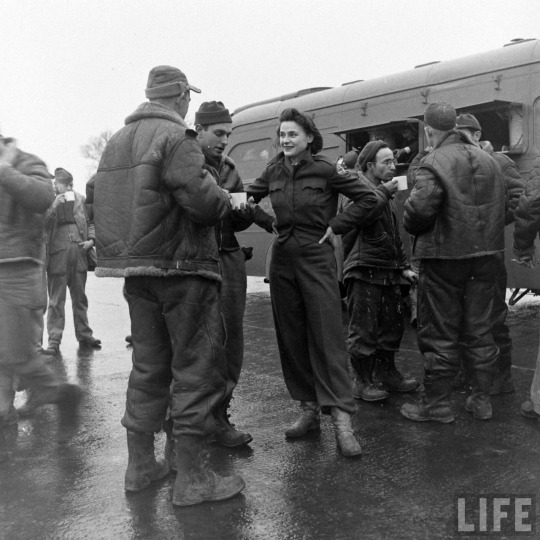
Katherine was 22 years old when she arrived in Europe with the Red Cross. (One of her traveling companions that trip was Kathleen Kennedy, daughter of former U.S. Ambassador Joseph P Kennedy Sr., also coming to serve overseas with the ARC.)
The American Red Cross's mission in Europe had many facets during the Second World War - in addition to activities we might think of today, like collecting blood, providing disaster relief at home and running first aid seminars, they were responsible for collecting and distributing packages for Prisoners of War.
They also operated large canteens like the Rainbow Corner club, a recreational facility in London where soldiers on leave could get a room for the weekend, a bite to eat, and a number of other amenities. Smaller clubs called Donut Dugouts provided a space where a serviceman could always be assured of a cup of hot coffee, a donut, and a pretty girl to talk to, specially recruited for being friendly, fair, approachable, and specially trained to be the girl next door overseas. In addition to these more permanent installations, they also operated the Clubmobile service, a mobile version of their popular Dugouts that moved operations into retooled Green Line Bus Company buses to take donuts and a taste of home to the front line.
Tatty, as she was called, worked on the Clubmobile "North Dakota" along with Julia "Dooley" Townsend, Virginia "Ginny" Sherwood, and Dorothy "Mike" Myrick. Life Magazine did a full article on their clubmobile in February of 1943, which you can read online at the link. There is another lovely blog post with pictures here. She also worked for a time in a more permanent post at the USAAF base at Snetterton Heath, and was later sent to France. You can read a little bit more about her and see more pictures at her bio page at the American Air Museum in Britain website.
If you'd like more information about Tatty, Helen, and women like them, as well as the Clubmobile service, consider reading the following:
Slinging Doughnuts for the Boys by James H. Madison
Battlestars & Doughnuts: World War II Clubmobile Experiences of Mary Metcalfe Rexford
War through the Hole of a Donut, by Angela Petesch
Goodnight, Irene (fiction) - Although this is a novel, it is based on Luis Alberto Urrea's mother's time as a Clubmobile worker and her personal papers.
#women in world war two#women in wartime#original girl gang#american red cross clubmobile service#katherine tatty spaatz#masters of the air#i cannot believe it took me a WHOLE DAMN WEEK
228 notes
·
View notes
Text
Captain America
Pairing: Tom Bennett x fem!reader
Warning: World War II, Fluff, Angst, Tooth-Rotting Fluff, Family Fluff, did I mention this fic is very fluffy?
Summary: Tom's son was deeply convinced his father was the British counterpart of Captain America, his favourite comic hero. In his son's mind, he was a hero for protecting his mother and himself on the open sea.


Simon Bennett was the spitting image of his father. Dirty blonde hair. The most brilliant shade of blue. His cheeky grin. And the mischievous nature even at the tender age of four.
He was created the night after his father returned home from France. A night filled with passion and no caution for consequences.
His mother, his father’s school sweetheart and the love of his father’s life, had given birth to him nine months later during an air raid.

Tom woke up to the blaring of the sirens. He turned to his side, softly kissing the woman next to him awake. „Sweetheart, we have to go.“
He got up from the squeaky old bed and rushed around for their pre-packed bag.
You softly sat up. Rubbing your eyes before getting slowly out of bed. The large stomach in front of you limits your movements. Tom walked over with your coat in his arm, helping you stand and wrapping it around your shoulders.
He led you outside, trying to shield you from any flying rubble or glass as you made your way to the nearest air-raid shelter. His anxiety grew the longer you remained outside.
It was hard for you to walk. Your ankles are swollen and your back is hurting from the weight of the baby and the impending birth. You were in your last month, a month you should rest and stay off your feet.
Tom wasn’t the religious type. But he prayed for you not to go into labour this night. He should have prayed harder he thought as you stopped in the middle of the street. Right in front of the shelter.
A pained sob escaped your lips as you held your stomach. „Sweetheart!“ He let go of the bag of clothes and important things to rush to you. „The baby!“ You gasped. Tom saw the puddle forming on the street. His panic and his fatherly instincts kicked in.
He rushed to the bag and picked it up before he rushed back to you and picked you off your feet and into his arms. He rushed into the shelter before they closed the door.
Bombs fell outside as your screams filled the room full of people. He was thankful as a nurse stepped forward and helped you deliver the baby.

Simon Bennett drew his first breath when the aircraft over Manchester was gone.
It was a welcomed sound in the shelter after the explosions and falling buildings. Cheers broke out as his son screamed for the first time.
His face was red and his fists waving around as he declared his malaise about not being nestled in his mother’s warm womb anymore. Tom chuckled as he held the small boy. His smile grew larger as the small boy wiggled closer to his chest.
It had been hard for him to leave them behind to go to sea again. He had no choice, cursing the stupidity of his youth. The navy had given him plenty of time to be with his family.
Before he left, he married you. With Simon in your arms and Lois and his niece Vera as your witnesses. He had never seen a more beautiful sight.
The goodbye was the hardest. Everyone cried. You, Lois, him, even Vera. But the cry of his beautiful son was the most heart-wrenching one. He had already seen your tears the first two times he had gone to sea. He knew his heartache, but he didn’t anticipate how much Simon’s little cry would wound him.
As often as you could, you would write him a letter. Sending pictures with a few letters so Tom would see how his son had grown over the months, later years, he wasn’t home.
In one letter you wrote about your new employment with Robina Chase. He was glad you found employment with Harry’s mother as her housemaid. You were able to take care of Simon and Vera while working. And you were out of the city and the danger.

My dear Tommy,
I hope you are well. We haven’t heard anything from the Navy. Robina’s military contacts couldn’t get through to the Navy. I guess you are engaged in a battle or you are too far to reach. I hope it’s the last.
Simon and Vera are getting along nicely. They started to crawl, giving me a hard time to clean the floors. Sometimes they would race each other, giggling like madmen.
He also started to make sounds. It’s funny how I would point to something and he would make a sound. His favourite so far is car noises. When you come home he can probably call you ‚daddy‘ or ‚papa‘.
Besides Simon’s progress, I think I made progress with our hostess. It seems Robina has grown fond of me. I am the caretaker of her granddaughter after all. She has given me more days off now. Inviting me to go on walks with her. Asking me about both children’s development. She seemed genuinely interested.

Your letters to him were his lifeline. His hope of returning home. Every chance he got he would write back. He wrote ten each day. Hoping some of them will reach you. He needed you to know he was still alive and well.
He would sew the pictures you send him into the pocket of his shirt so he could carry them with him at all times and not lose them. And if he should die, you and Simon would be next to him.
Simon was three years old when an American soldier gifted him his first Captain America comic.
You always had to read it to him at night time. He insisted on it. “He is like daddy.“ He would say. “Daddy is my Captain America.“ You smiled at your boy. His grin was always so cheerful when his eyes danced over the pictures on the paper. He loved the adventures of Steve Rogers. Imagining his father fighting the bad man at sea.
Robina had even gone out of her way and had smuggled some comics into England for Simon’s fourth birthday.
But his greatest gift was his father.

You were standing at the docs with Simon sitting on your shoulders. Both of you are searching for a familiar mop of blonde hair. It became a game as more men left the belly of the ship. ‚Spot Daddy‘ Simon called it.
As he finally spotted his father, Simon became more excited. He was shouting for him, waving enthusiastically.
Tom looked up as he heard an unfamiliar child's voice calling for his father. His brows moved together as the boy waved and even shouted his name.
His eyes widened as he saw the woman the boy was sitting on top of her shoulders. You smiled up at your son as best as you could before turning back to look in front of you. Watching him rush over to you. Weaving through his fellow shipmates before finally reaching the both of you.
He took Simon from your shoulders. Groaning mockingly as he held him to his chest. Kissing his red cheeks. „My boy has grown!“ He laughed. “he is better fed than I am.”
Simon hugged his father for the first time in his four years. Savouring the warm feeling. „Welcome home, daddy. I missed you.“ He mumbled into his neck. His small arms tightened around his neck.
Tom tightened one arm around his son’s body, while the other pulled you to his chest. Kissing both yours and Simon’s forehead. „Missed you more, kid.“ He whispered against his son’s cheek.

Tom came home from work. It was late afternoon, the sun had already set. His body was weary from the heavy lifting.
„Honey, I am home!“ He called as he walked further into the house. There was no reply, the house quiet. He walked into the living room, Simon sitting on the sofa, reading another comic.
The boy’s head turned, a large grin breaking out on his small face. It was infectious, a smile breaking out on his face. „Where is Mama?“ Tom asks softly. „Upstairs, Mary has been fussy all morning. Something about teething, Mama said.“ Tom nodded softly. Later he should have a look at how his two girls were fairing.
Simon went on to read his precious comic. Tom sat next to him on the cushion. „What is he doing now?“ „He is fighting Hydra. There is a bad professor who would like to recreate the super soldier serum.“
Tom smiles, reading the last pages with his son before whispering, „I think I saw the next one at the paper stand. Wanna check if it’s there?“ Simon eagerly nodded. Rushing off the couch and racing to the front door. Tom was not far, taking his son’s hand and skipping to the newspaper stand down the road.

Main Masterlist
Can't get enough? Tell me about it...
#tom bennett#tom bennett x reader#tom bennett x y/n#tom bennett fanfiction#tom bennett x you#ewanverse#ewan nation#world on fire#tom bennet x reader
110 notes
·
View notes
Text

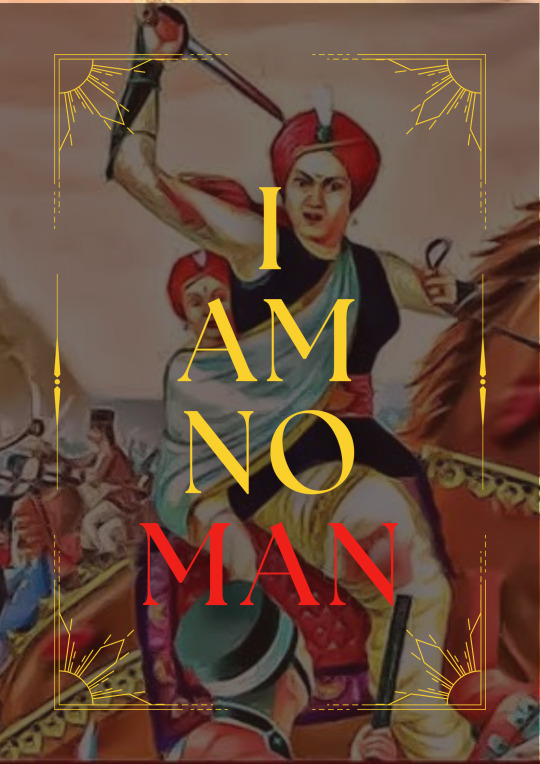
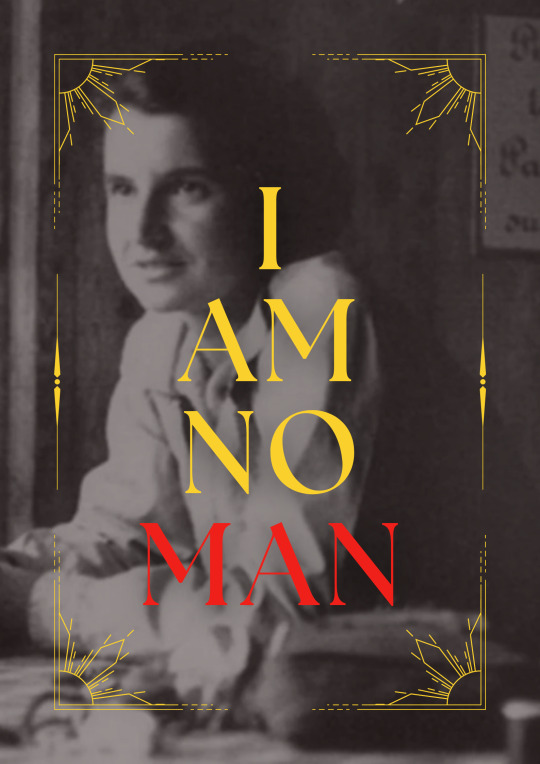



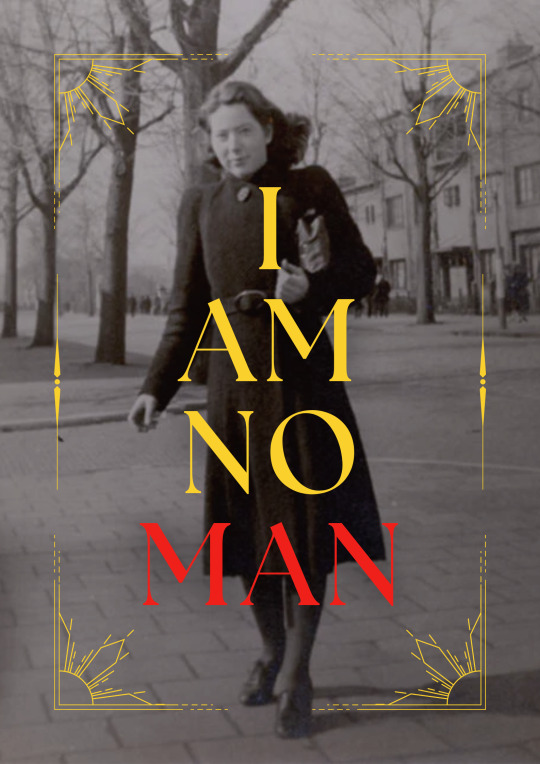


Throughout history, women have left an undeniable impact on society with their hard work, creativity, and dedication to progress. Unfortunately, their accomplishments have often gone unnoticed, been undervalued, or even stolen. Despite these challenges, brave women of today continue to push boundaries, break barriers, and pave the way for a more fair and equal world. It's our duty to keep going, so that future generations of women can inherit a kinder, more just, and supportive world. By following in the footsteps of the incredible women who came before us, we can create a world where every woman can flourish and succeed, and where their contributions are recognized and celebrated.
Joan of Arc is a patron saint of France, honored as a defender of the French nation for her role in the siege of Orléans and her insistence on the coronation of Charles VII of France during the Hundred Years' War. Claiming to be acting under divine guidance, she became a military leader who transcended gender roles and gained recognition as a savior of France. She was put on trial by Bishop Pierre Cauchon on accusations of heresy, which included blaspheming by wearing men's clothes, acting upon visions that were demonic, and refusing to submit her words and deeds to the judgment of the church. She was declared guilty and burned at the stake on 30 May 1431, aged about nineteen.
Rani Lakshmibai was the Maharani consort of the princely state of Jhansi from 1843 to 1853. She was one of the leading figures in the Indian Rebellion of 1857 became a symbol of resistance to the British rule in India for Indian nationalists. When the Maharaja died in 1853, the British East India Company under Governor-General Lord Dalhousie refused to recognize the claim of his adpoted heir and annexed Jhansi under the Doctrine of Lapse. She rode into battle with her infant son strapped to her back, and died in June 1858 after being mortally wounded during the British counterattack at Gwalior.
Rosalind Franklin was a British chemist and X-ray crystallographer whose work was instrumental in the discovery of the structure of DNA. Her contributions were largely overlooked by her male colleagues, James Watson and Francis Crick, who used her data without her permission or acknowledgement. This theft of her intellectual property and erasure of her contributions is a prime example of the systemic sexism that has historically plagued the scientific community.
Hedy Lamarr was an Austrian-American actress and inventor who co-invented a frequency-hopping spread spectrum technology during World War II that was used to guide torpedoes. However, her contributions were largely ignored and dismissed by male engineers and the military at the time. It was only later in life that she received recognition for her scientific achievements.
Emma Weyant is an American competitive swimmer. She was the US national champion at the individual medley. She qualified for the 2020 Olympic Games in the 400m individual medley and won the silver medal in this event. Weyant finished second in the 500-yard freestyle at the 2022 NCAA Division I Women's Swimming and Diving Championships. She was beaten by William (Lia) Thomas, a fetishist, who when competing as a member of the Penn men's team, which was 2018-19, ranked 554th in the 200 freestyle, 65th in the 500 freestyle and 32nd in the 1650 freestyle. Weyant is the fastest swimmer in the 500-yard freestyle and had her position stolen by a man.
Maryna Viazovska is a Ukrainian mathematician who made a breakthrough in sphere packing, solving the centuries-old mathematical problem known as the densest packing of spheres in dimensions 8 and 24. She was awarded the Fields Medal in July 2022, making her the second woman (after Maryam Mirzakhani), the second person born in the Ukrainian SSR and the first with a degree from a Ukrainian university to ever receive it.
Hannie Schaft was a Dutch resistance fighter during World War II who played a crucial role in the resistance movement against Nazi occupation. Schaft was a former university student who dropped out because she refused to sign a pledge of loyalty to Germany. Nazis arrested and killed her in 1945, just three weeks before the war ended in Europe. According to lore, Schaft’s last words were, “I’m a better shot,” after initially only being wounded by her executioner.
Shakuntala Devi was an Indian mathematician and mental calculator who was known as the "Human Computer" for her exceptional ability to perform complex mathematical calculations in her head. Her extraordinary abilities earned her a place in the 1982 Guinness Book of Records. Her lesser known achievement is that in 1977 she wrote what is considered to be the first book in India on homosexuality titled “The World of Homosexuals.”
J. K. Rowling is a British author and philanthropist. She wrote Harry Potter, a seven-volume children's fantasy series published from 1997 to 2007. Known for her philanthropy, she was doxxed and harassed after coming out with support for women's and gay rights in 2020. Rowling secretly donated hundreds of thousands of pounds to save 100 female lawyers and their families facing murder in Afghanistan. In 2022, she funded a women's only rape shelter in Edinburgh.
#this post was inspired by me being absolutely sick of trans activists claiming that joan of arc/rani lakshmibai/insert literally any other#strong woman#is actually a trans man#they were no man at all#women have been brave and strong and amazing throughout history#and they still are#if only you'd get your head out of your ass to take a look#radical feminism#radblr#terf#trans#misogny#i am no man
682 notes
·
View notes
Note
I think what’s most dystopian about the genocide of Palestinians is that the United States isn’t just complicit, it’s basically ensuring the genocide continues. More than just the axis powers during World War II, Israel literally could not get away with this without the US.
What do we call it when a powerful country has the power to ignore international criminal law and human rights law and actively fund a genocide, and get away with it ?
The US didn’t need to invade Palestine to destroy it… it just needed to bankroll Israel.
That's literally why the Zionist occupation exists, to enact colonial core interests in the region. Not just the US, but Australia, New Zealand, Canada, France, Most of Europe, and even the Ukraine. To paraphrase Butcher Biden, "If Israel didn't exist, the US would create one to serve their interests." For what it's worth, Zionists acting on US interests isn't new. Their biggest industry is arms dealing and have supplied every force that supports Western interests with weapons since the 60s. The Occupation is currently supplying weapons in Congo, Sudan, Myanmar, Ukraine, and so many other places where the West can't intervene directly. This is why it's so important to support the Boycott, Divestment and Sanctions movement because it attacks the Zionist network of supply and financing. Please, support your local BDS chapter.
108 notes
·
View notes
Text

Americans at home had it easy during World War II. This display of foodstuffs, rationed and unrationed, in the United States as compared with several European countries, was an exhibit at the Museum of Science and Industry at Rockefeller Plaza, March 8, 1943. It shows basic rations for one day in the U.S., Britain, France, Poland, and Czechoslovakia. Sugar, tea, and coffee were the only rationed U.S. products at that time (meat and other food items had been rationed earlier) on this chart. In all other countries, every item displayed was rationed.
Charles Kenneth Lucas for the AP via Flashbak
#vintage New York#1940s#World War II#Charles Kenneth Lucas#home front#rations#rationed food#rations World War II#food#food rations#World War II at home
87 notes
·
View notes
Note
What would you say it’s the biggest misconception about French revolution?
If I have to choose ONE thing, I’d say it would be that what is known as the Terror was not a specific government policy and that it was retroactively constructed as such for political gain of a specific group of people.
Expanding from that: what happened in 1793-1794 should be viewed as a state of emergency as a response to war – while not everything that happened is directly related to the war, this is a key component that is often missed when discussing the Terror. Many people don’t even know that France was at war and that the state of emergency due to this is a common thing that happens at the state of war. Things like martial law introduced, more powers to the government, stricter laws (particularly for military misconduct and treason), suppression of the constitution and civil rights and freedoms – all of this is a pretty standard set of measures that happen during wartime. (True for frev, World War II, current war in Ukraine, etc.) And this is also true for suppression of any inside rebellions that go against the war effort and the government. Nobody says that people have to like and support what happened during what we know as the Terror, but it is important to contextualize it correctly. (And nobody says that what happens during emergencies is nice necessarily - it's just that state of emergency is kind of a standard response to the war situation and has to be viewed as such, vs as some sort of a special case that happened during Terror because of evil revolutionaries/Robespierre/etc).
And also related to this, it’s important to say that while they did manage to win the war (at that point), the way that these measures were implemented was faulty. It was faulty not because the government had so much control over France, but quite the opposite – the biggest problem was that they had very little control. The infrastructure was not there, the institutions were not there; they were basically inventing/perfecting the modern government system on a large territory that just was not ready for it yet (both in institutional AND cultural sense). It was not possible to control properly what was going on. They tried (and some of those attempts were better than the others, some were bad, some were horrible, etc.) but they had no proper control. The situation during Terror was more akin to anarchy than a powerful authoritarian state (led by Robespierre) that is often imagined. Everyone implemented emergency measures in their local community how they saw fit, which led to some of the worst crimes committed during this period. And part of the problem were vague instructions from Paris (so it’s not like they don’t have their own share of responsibility). So, it was more of a chaotic mess + war with half of Europe + counter revolutionary conspiracies inside and outside (another misconception was that revolutionaries were paranoid about this – nah, this shit was real. The problem was that they didn’t always go after the right people who were to blame for conspiracies, but conspiracies def existed).
570 notes
·
View notes
Text
The Best News of Last Week 🐧
1. ‘Robin Hood’ energy strikers give free power to French schools, hospitals, low-income homes
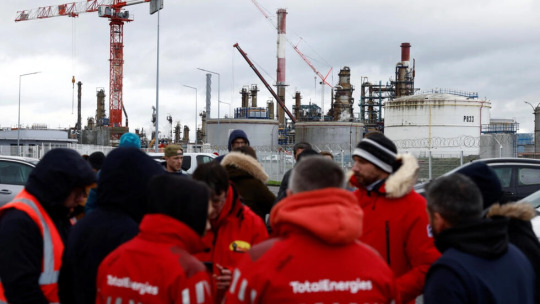
Amid national strikes in the energy sector, some workers in France have found a novel way to protest. On Thursday, "Robin Hood" operations – unauthorised by the government – provided free gas and electricity to schools, universities, and low-income households throughout the country.
Among the facilities provided free energy were public sports facilities, daycare centers, public libraries, some small businesses and homes that had been cut off from power.
2. UK scientists discover method to reduce steelmaking’s CO2 emissions by 90%

Researchers from the University of Birmingham have developed an innovative method for existing furnaces that could reduce steelmaking’s CO2 emission by nearly 90%.
The iron and steel industry is a major cause of greenhouse gasses, accounting for 9% of global emissions. That’s because of the inherent carbon-intensive nature of steel production in blast furnaces, which currently represent the most-widely used practice.
3. Watch this cargo ship fly a giant kite to save fuel and cut emissions

The 2,700-square-foot parafoil is helping to tow the cargo ship and lessen the workload of the massive diesel engines — reducing the ship’s use of dirty fuel.
4. Scientists discover emperor penguin colony in Antarctica using satellite images

A newly discovered emperor penguin colony has been seen, using satellite images of one the most remote and inaccessible regions of Antarctica.
The colony, home to about 500 birds, makes a total of 66 known emperor penguin colonies around the coastline of Antarctica, half of which were discovered by space satellites. Emperor penguins are the only penguins that breed on sea ice, rather than land, and are located in areas that are very difficult to study because they are remote, inaccessible and can experience temperatures as low as −60C
Kowalski, analysis!
5. Dungeons & Dragons Scraps Plans to Update Its Open Game License

Wizards of the Coast, publisher of Dungeons & Dragons, announced yesterday that it will no longer be pursuing deauthorization of the Open Gaming License 1.0a. The deauthorization of the OGL 1.0a was a huge sticking point for fans and third-party publishers who made a living using a license that was granted nearly two decades ago.
6. Turning problem sea algae into a replacement for plastic

Excessive outbreaks of seaweed and microalgae are clogging up waters from the Caribbean to the Baltic. Now both are being harvested alongside farmed crops to create ingredients for cosmetics and food products.
7. German parliament officially commemorates LGBTQ victims of Nazi regime for first time.

The German parliament for the first time on Friday focused its annual Holocaust memorial commemorations on people persecuted and killed over their sexual or gender identity during World War II. Campaigners in Germany have worked for decades to establish an official ceremony to commemorate the LGBTQ victims persecuted under the Nazi regime.
“Today’s hour of remembrances focuses on a group of victims which had to fight for a long time to achieve recognition: people who were persecuted by the National Socialists because of their sexual orientation or their gender identity,” Baerbel Bas, president of the Bundestag lower house, said while opening a ceremony marking International Holocaust Remembrance Day, the anniversary of Auschwitz’s liberation.
- - -
That's it for this week. If you liked this post you can support this newsletter with a small kofi donation:
Buy me a coffee ❤️
Have a great week ahead :)
396 notes
·
View notes
Photo
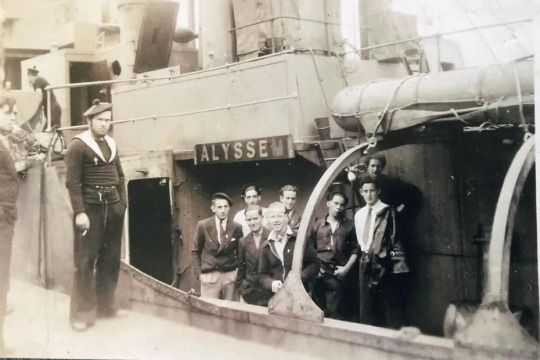
Escale de l'Alysse en juillet 1941 à Saint John's - Départ des derniers évadés de St-Pierre partis rejoindre les forces Françaises libres en Angleterre.
© Collection Eugène Théault
#newfoundland#st. john's#newfoundland history#saint-pierre et miquelon#st-pierre#forces navales françaises libres#la france libre#free french#forces françaises libres#newfoundland in the british empire#french colonial empire#world war II#canada during world war 2
1 note
·
View note
Text
As the name suggests, the World Wars involved the world. People from all over served, and this includes people from African and Carribbean countries, yet I feel they are not so well-remembered in media and the history books for their heroics and sacrifices. Here are a few icons among many below.
Eugene Bullard

Eugene Jacques Bullard (1895-1961) was one of the first black American pilots and served in the French air force’s Lafayette Flying Corps, an all-American volunteer outfit, in World War 1. Meanwhile, in World War 2, Eugene Bullard served as a spy for France, where he also proved highly successful against the Nazi regime. Bullard was fluent in English, German and French, as well as a boxer and self-taught Jazz musician.
Eugene Bullard was awarded fifteen French war medals: Knight of the Légion d’honneur, Médaille Militaire, Croix de Guerre, Volunteer’s Cross (Croix du combattant volontaire), Wounded Insignia, World War I Commemorative Medal, World War I Victory Medal, Freedom Medal, and the World War II Commemorative Medal.
Walter Tull

Lieutenant Walter Tull (1888 - 1918) was the first British-born black army officer and the first black officer to lead white British troops into battle. He fought on the Somme in 1916 and became the first black combat officer in the British army in spite of a military rule officially excluding "any negro or person of colour” from that position. Before the War, he was a pioneering black football player and the first black outfield player to feature in the English top flight, with two seasons at Tottenham Hotspur.
Sadly, Walter Tull was killed in 1918, during the early German spring offensive, and was never awarded the military cross that he was recommended for.
Johnny Smythe

Born in Sierra Leone, Johnny Smythe (1915 - 1996) successfully made it into RAF aircrew during the Second World War. Smythe trained as a navigator, having a great talent for mathematics. He successfully navigated 26 bombing missions over Germany, although was unfortunately shot down on his 27th mission and captured. Smythe would spent the last two years of the war in Stalag Luft I, an infamous Lufftwaffe-run POW camp, until he was liberated by the Russians in 1945.
In 1948, Johnny Smythe served as the senior officer aboard the Windrush. After pursuing a career in law and working as the Queen's Counsel for Sierra Leone for a number of years, in 1961 he was appointed Solicitor General of the newly independent Republic of Sierra Leone. In 1978, he awarded the Order of the British Empire (OBE) for his outstanding service.
Ulric Cross
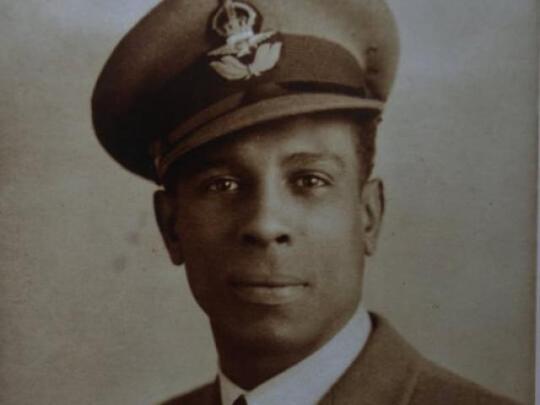
Ulric Cross (1917 - 2013) was Trinidadian and one of the most decorated Caribbean airmen in WWII. Joining the RAF at 24, he trained as a navigator and joined 139 Squadron, gaining the nickname ‘The Black Hornet’. Cross was an expert in precision bombing and later joined the ranks of the elite Pathfinder Force, flying high-risk missions into enemy territory as low as 50 feet as opposed to 25,000 like most pilots. While Cross was offered the option to rest after completing 50 missions, he instead volunteered for another 30 missions over enemy territory. At the end of the War, Cross had flown a total of 80 missions.
For his undeniable commitment, hard work and skill, Cross was awarded the Distinguished Flying Cross and the Distinguished Service Order.
#world war 2#world war 1#us history#uk history#africa#sierra leone#trinidad#black soldiers#world war means WORLD War#someone write a movie about these guys and many others#history#black history#caribbean
151 notes
·
View notes
Text
24 Days of La Fayette - Day 3
Have you ever wondered, why the National Guard is named the National Guard? If so, then I have a painting for you:
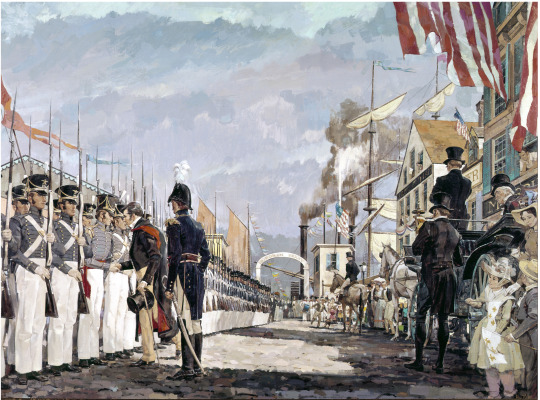
Lafayette and the National Guard, a National Guard Heritage Painting by Ken Riley, courtesy the National Guard Bureau (12/03/2023).
La Fayette’s Tour through America in 1824 and 1825 was the event of its time. People turned out by the thousands whenever La Fayette visited and even after over a year the people were still as enthusiastic as on the first day. It were not only civilians that lined the streets to greet La Fayette but also military personal. During La Fayette’s stay in New York, immediately prior to his departure for France, a company of militia men, the 11th New York Artillery, later the 7th regiment, lined the street for La Fayette. The unit had named themselves the National Guard in memory of La Fayette’s National Guard during the French Revolution. La Fayette was apparently so touched when seeing these men, that he halted his carriage and shook the hand of every single soldier. This moment is depicted in the painting.
I could sadly find no reference to this encounter in Auguste Levasseur’s book, but we do know that by 1903 the name National Guard had become so popular that it was adopted nationwide.
The painting was done by Kenneth Pauling Riley, in, I assume 2004. Riley could at that point already look back onto a long career. He had become a war artist in World War II and after the war, President John F. Kennedy purchased on of his portraits, The Whites in their Eyes about the Battle of Bunker Hill, for the White House. Riley died in 2015.
#24 days of la fayette#marquis de lafayette#french history#la fayette#american history#history#kenneth pauling riley#2004#national guard#auguste levasseur#french revolution#triumphant tour#tour of 1824/1825
82 notes
·
View notes
Text
"And what shall be the reward of spilling so much blood, one drop of which has more worth than all the crowned heads of the world?"
L’Ami du Peuple, No 634, from Thursday 19th April 1792.
[The very next day, on the 20th April 1792, war was declared against Austria]
If it was still impossible to doubt the traitorous dispositions of the court, after all the plots that it has formed to this day, in order to crush the people, to ruin the nation, and to re-establish despotism, the scene of high scandal that the ministerial cabinet has just been playing out should have sufficed to open the eyes of all.
On the 14th of this month, the ministers presented themselves in the Assembly. The Minister of Foreign affairs [Dumouriez; he took this post on 15th March 1792] took the floor to communicate to them, after the orders of the king, of the dispatches that, he said, were delivered by an extraordinary courier who arrived during the night. He first read out the letter written [by Louis XVI] to sieur [Louis Marie Antoine, Vicomte de] Noailles, ambassador at the court of Vienna, demanding the new king of Hungary [Franz II of the Holy Roman Empire, nephew of Antoinette] to give a categorical response on his attitudes towards France. He then read out the response of sieur Noailles, containing a formal refusal to continue a negotiation that he [Noailles] said was impracticable and an announcement of his [Noailles’s] resignation. He [Dumouriez] proceeded to give a reading of a very pressing dispatch [from Louis XVI] addressed to sieur Noailles. Finally, he [Dumouriez] announced that Louis XVI had just written in his own hand a letter to the king of Hungary, and sieur Molle the field marshal was to deliver it. The response to this letter would arrive on the 10th of next month at the latest and would decide whether peace or war would be. In this epistle, one can clearly sense that Louis XVI is repeating his crude joke of professing his love for the Constitution.
Scarcely had these readings been finished than sieur Briche and sieur Guadet demanded a decree of indictment against sieur Noailles for having disobeyed the orders of the king; they must say so, for he had betrayed the interests of the nation and compromised public safety. After several light debates, this decree was given a near-unanimous pass. Already the ones that did not follow the thread of the story were singing to their victory, for they saw that he was declared a nation-harming (lèse-nation) criminal, he who is an ambassador of France, a close relative (cousin-germain) to sieur Motier [Noailles and Lafayette had the same father-in-law], a member of the Tuileries committee, and a pillar of the Feuillant club; that is to say, one of the main conspirators, bolstered by all the forces of his accomplices, and sure of the support of the vast majority of counter-revolutionary conscript fathers. But their joy was short-lived. Several hours after the decree of indictment, the veil was ripped to lay bare the juggleries of the ministerial cabinet. Sieur Dumouriez appeared on stage to announce to the president a letter that he had allegedly just received from sieur Noailles, who had finally obeyed the orders of Louis XVI and had given news that the king of Hungary refused all negotiations, declaring war on the French nation.
Immediately Thuriot, Goupilleau, Vaublanc, Gentil, Dumas *and the other gangrenous ministers demanded that the decree of indictment be revoked. Sieur Kersaint and Sieur Delacroix ⁑ proposed that the letter of the minister [Dumouriez] and the dispatch of the ambassador be sent back to the diplomatic committee, so that the report would be done on time.
The report done, under the name of the committee, by sieur Lasource, the decree of indictment was adjourned. Such was the conclusion of the ministerial and senatorial farce against sieur Noailles. Thus, by the method of a double correspondence, the perfidious agents of the prince will always get away with their deeds, just like how pirates escape by the method of using false flags. Always the artifices of the court will render the laws illusory; always the apparent acts of justice from the legislator will be none but lures to deceive the people; and no matter how things turn out, always the public enemies at the helm of the vessel of the State will manage to throw it at the reefs, and to direct it in such a way as that shall see it broken by the storm and engulfed by the waves in the end.
So finally here is war declared on the French by the powers plotted against freedom. However, who does not see that all these pretend ministerial negotiations with foreign courts had no other goal than to amuse the nation and to buy time, until all these powers have their batteries loaded, and they are ready to shoot us? Who does not see that all these bellicose preparations, arranged by the Assembly, had no other goal than to lure the nation to sleep in deep dreams of security? Who does not see that all these sending-back to the executive power, the denunciations, the prevaricating ministers, and these complaints of citizen soldiers crammed onto the frontiers and left without munitions, without weapons, without clothes, without pay, had no other goal than to leave the patrie with no means of defence, to leave the State in the grip of the machinations of the court, of the undertakings of the fugitive plotters, of the attacks of the foreign lackeys.
Will there be war? Everybody is saying yes. It is certain that this opinion has finally prevailed in the cabinet, after the representations of sieur Motier who, without doubt, has made it the only way in order to distract the nation from the concerns within to occupy with concerns without, in order to make the nation forget the internal dissensions in favour of news in gazettes, in order to dissipate the national property into military preparations, instead of employing it to liberate the State and to comfort the people, in order to crush the Nation under the feet of taxes, and in order to slit the throats of patriots of the infantry and of the citizen army, leading them to the butcher’s, under the pretext of defending the barriers of the empire.
It is always certain that he pressures the monarch to stop negotiating and to order the campaign to be started, which he regards as a means to honourably end his own career, if he runs out of ways to regain the nation’s confidence with new acts of seduction and of hypocritical devotion to the cause of liberty.
Lost in the heady rhetoric from Brissot, from Lemontey, from Girardin, from Delacroix, from Gouvion, from Dumas and from other scoundrels who have sold themselves to the court, seduced by a false image of national forces, intoxicated by the fumes of Gallic boastfulness, the people seem no less desiring for war than their implacable enemies do. For three years I have represented war as the last resort of counter-revolutionaries and I have not stopped working to thwart the various undertakings of the cabinet to set it aflame. Since then, my attitude has not changed, and in my eyes, war is always the cruellest curse that may be cast on the kingdom. Whatever new focus that war will draw public attention to, by only fixing it onto news in gazettes, war will leave an open field for the enemies within to machinate at their ease and to breathe the fire of civil dissensions into all parts of the kingdom, to instigate troubles, and to set traps for proponents of freedom; the war will completely squander the national property and accelerate public bankruptcy; the war will consummate the loss of everything that France has in good citizens and it will drain the State of all the patriotic youth, because it is the most zealous proponents of the revolution who have been rushing to the defence at the frontiers, and they will always do so.
However fearless they may be, they are without weapons ¹, without discipline, without tactics, without idea of grand manoeuvres ², without the smallest notion of the art of war, without experienced chiefs, without shrewd and faithful generals. How would the soldiers of the patrie resist the attacks from the disciplined armies of lackeys, they who are commanded by shrewd generals?
If war happens, I repeat, regardless of the bravery of the defenders of freedom, it does not take an eagle-eyed genius to foresee that our armies will be crushed in the first campaign.
I can conceive that the second campaign would be less disastrous and that the third could even be a glorious success, since it is impossible that we would not learn at our own expense, impossible that some great man would not be given a position. Yet, to wrest victory from our enemies, we will need to suffer a long and disastrous war. Now, it would fall short of the truth, to say that our losses, over three campaigns, shall round to a billion livres and five hundred thousand combatants.
How shall we compensate for the loss of so many brave soldiers, the flower of the French citizens? And what shall be the reward of spilling so much blood, one drop of which has more worth than all the crowned heads of the world? To prevent this precious blood from being shed, I have proposed for a hundred times an infallible method, which is to take hostage among us Louis XVI, along with his wife, his son, his daughter, his sisters ⁂, and hold them accountable to what happens. A senate faithful to the patrie will speak to him thus: “King of the French, it is in vain that you (vous) hide in the detours of a tortuous policy to see us ensnared in the disasters of war; you have no escape from the avenging power of the people. We declare to you, in the name of the nation, who is your august sovereign, that we do not wish to deal with your fellowmen, the princes of Europe, that we wish to make no preparations at all for war. Whether or not you compromise with them is your choice. The duty to remind your rebellious brothers and cousins is upon you, and so is the duty to divert your fellowmen from all hostile undertakings. The barriers of the State will stay open, yet rest assured that upon certain news that the first corps of enemies shall have crossed them, your culpable head will roll at your feet, and your entire dynasty shall be extinguished in its own blood.”
But a senate faithful to the patrie is even rarer than a patriotic king. How insensible the people is, that they do not sense the necessity to finally choose a supreme dictator, to give him powers that would be circumscribed, so that he would have no authority to dominate, but unlimited authority to cut down the chief conspirators that the public voice has identified, to force the corrupt legislator to put at a price the heads of kings, of princes and of the generals who will come with weapons against us, to offer sums of gold to their troops who will deliver these kings, princes, and generals to us, living or dead, and to receive these troops among children of the State. Soon we shall see their numerous legions, running with weapons and equipment under the flags of freedom, and France shall be delivered from her enemies forever.
The fate that awaits her is less consoling for the friends of the patrie, but the fate that awaits her enemies will be terrible.
At the first shot of the canon fired on the frontier, the departments agree on a plan to reduce the castles and the gardens to ashes and to slit the throats of all public enemies who can be found in cities and in the countryside. As the army will massacre its own perfidious chiefs and conspiratorial generals, and as the entire nation will rise up against its own worthless representatives to seize back the powers that they have stripped from her, the mysterious veil long hung over the intrigues of the cabinets will be torn: however impatient the cabinets are to put the French back into chains, I strongly doubt that Louis XVI shall have the humour to do nothing if he even takes a look at this terrible picture. Let some good man have the courage to put it before his eyes.
---------------------------
Notes in the original:
[1] It is an unchanging fact that sieur de Grave, despite all his civic affectations, has not given a single order to prompt the ministry to arm the national guards of the frontiers since he arrived at the ministry. It is upon their actions, and not upon their talk, that the royal agents must be judged.
[2] It was to prevent the citizen battalions from training for grand manoeuvres that the generals have kept them divided and dispersed into different posts.
Translator's notes:
*This would be Mathieu Dumas (1753 - 1837), a colonel of the general staff of Paris, long lambasted by Marat for refusing to fight, and whose name had come from his father, and not to be confused with Thomas-Alexandre Dumas (1762 - 1806) the Haitian general, whose name had come from his mother, an enslaved and nigh-erased woman.
⁑ This would be Jean-François Delacroix (1753 - 1794) the Dantonist, not to be confused with Charles-François Delacroix (1741 - 1805) the Thermidorian, and father to the painter Eugène Delacroix (1798 - 1863).
⁂ Marat notably did not mention either of the brothers of Louis XVI, because the comte de Provence (future Louis XVIII) emigrated in June 1791 to the Austrian Netherlands, and the comte d’Artois (future Charles X) emigrated even earlier, on 17th July 1789 to Savoy.
I am indebted to @citizen-card for helping me with finding out about the relation between Motier and Noailles, and to @lamarseillasie for making me interested on "just what was Marat's view on dictatorship" in the first place.
36 notes
·
View notes
Text
Who Were the "Hessians"?
A good article from Facebook by Dr Alex Burns;

Myth 1): German troops were all Hessians.
Although most came from the mid-sized German state of Hessen-Kassel, troops from six different principalities (Hessen-Kassel, Braunschweig-Wolfenbüttel, Hessen-Hanau, Ansbach-Bayreuth, Waldeck, and Anhalt-Zerbst.) Indeed, the current leading progressive reenactment group portraying these soldiers represents Regiment Prinz Friedrich, essentially a garrison unit from Braunschweig-Wolfenbüttel.
If you include the larger, global war outside America, fought in places like Gibraltar and India, troops from the state of Hanover (Braunschweig-Lüneburg) also fought for the British outside of the Holy Roman Empire (the pre-German territorial entity.) So, while over 60% of these troops came from Hessen, they really hailed from all over the western and central Holy Roman Empire. As a result, it might be better to call them something other than Hessians. "Germanic" has been put forward, but that usually conjures up images of the fall of the Western Roman Empire.
Myth 2): They were mercenaries.
Imagine you are a soldier in the United States Army, serving in West Germany during the Cold War. You are stationed there because of longstanding agreements and alliances, which stretch back decades. The United States Government and the West German government have a financial understanding that helps maintain your presence in the region. Are you a mercenary? The situation was very similar for the German-speaking soldiers who fought in the American War of Independence, They had a longstanding relationship with Great Britain, stretching back decades. They had fought with alongside the British since the 1690s, both in continental Europe and in the British isles. As a result of the Hanoverian succession in 1714 (the British Royal family was drawn from Hanover) they had longstanding marriage connections with Great Britain. Horace Walpole, a British politician from the 1730s, referred to the Hessians as the Triarii of Great Britain.
These soldiers did not personally or corporately take on contracts from the British. they were members of state militaries: their governments were paid a subsidy by the British in order to fight in their wars. Frederick II (the Great) of Prussia, received subsidies from the British during the Seven Years War. As a result, the modern German term for these troops is *Subsidientruppen, *or subsidy troops. **Thus, it might be better to speak of the German-speaking subsidy troops, as opposed to calling them Hessians, or mercenaries. **Historians have argued that it might be fitting to call their countries "mercenary states". This is different from saying they were mercenaries.
Myth 3): They were sold to America because their princes were greedy and wanted to build palaces and pay for their illegitimate children.
The princes of the Western Holy Roman Empire lived in an incredibly dangerous world during the eighteenth century. Their territories were small, rural, principalities, trapped between the military giants of France, Austria, and Prussia. As a result, from the 1670s, these princes attempted to use subsidy contracts to build themselves larger armies, in order to preserve their independence. These subsidy contracts were a standard feature of European politics, diplomacy, and conflict resolution. They allowed the princes to better protect their small domains. None of the princes who formed subsidy contracts with Britain during the American War of Independence were doing something radically new or greedy. Instead, they were following on decades of practice which had allowed them to maintain their own independence. The Hessian (Hessen-Kassel) Landgraf Friedrich II actually used the funds from the contract, in part, to promote economic development and the textile industry in his territories. **Some of them had illegitimate children. Some had palaces. Portraying them as sex-crazed misers limits our understanding of the economic and security necessities which actually underpinned their subsidy policies. **Following the long-standing practices of their governments, princes in the Western Holy Roman Empire entered subsidy agreements to maintain the costs of their states.
Myth 4): They committed many brutal war-crimes in America.
The subsidy troops had been used in messy civil conflicts before. Hessian troops were used against the Jacobites in 1745-6, where they remarkably refused to take part in the repression against the Scottish Jacobites. Their troops were remembered in Perthshire, Scotland, as "a gentle race," and their commanding Prince (Friedrich II) declared, "My Hessians and I have been called to fight the enemies of the British crown, but never will we consent to hang or torture in its name." (Duffy, *Best of Enemies, *p. 133). English officers in the Seven Years War, noted that their troops were reprimanded for plundering more than Hessian forces. (Atwood, *The Hessians, *p. 173). In North America during the War of Independence, the Hessians once again behaved better than their British counterparts. Although there was a surge of fear about Hessian brutality early in the war, after the first few years of the war, Americans believed that the Hessians treated them better than British soldiers. Aaron Burr wrote of Hessian atrocities: "Various have been the reports concerning the barbarities committed by the Hessians, most of them [are] incredible and false." (Matthew Davis, *Memoirs of Aaron Burr, *Vol 1. p. 107). Comparing the brutality of the Napoleonic Wars with the American War of Independence, a Hessian veteran who served in both wars commented: "Everything which the author has subsequently seen in this regard greatly exceeds what one should term cruelty in America, which in comparison with more recent times, can be regarded as nothing more than a harmless puppet show." (Adam Ludwig von Ochs, *Betrachtungen Ueber die Kriegkunst, *60-61.) Hessian troops committed crimes in America, there is no doubt. What is clear is that these crimes were not excessive for an eighteenth-century conflict.
Myth 5): Many of them deserted to America, where life was better.
Many Americans claim Hessian ancestry. As a result, it is common to encounter the sentiment that these "mercenary" troops were simply waiting to switch sides. In reality, most of these troops returned to their homelands in the Holy Roman Empire. A very small number switched sides before the end of the war, a larger (but still small) percentage elected to remain in America after the war ended in 1783. Far from being an act of rebellion, the princes encouraged their subsidy troops to remain in America if they desire: this would cut costs, and make the process of slashing the military budget easier in peacetime. Most returned to celebrations, public parades, and being welcomed by loved ones. For more on exact data of desertions, as well as the subsidy-troops' return home, see Daniel Krebs' book, *A Generous and Merciful Enemy. *The majority of these troops remained loyal to their princes, and returned home to their own native lands.
Who Were the Hessians?
The experience of 37,000 soldiers mainly drawn from six small counties is not all one thing. There are elements of truth to each of the myths about the Hessians, but their story is more complex than the myths that are told about them in English-speaking circles in North America. They were drawn from a fascinating world in Central Europe with its own customs, practices, and traditions. They entered the American story, and as a result, it is worth taking the time to understand and remember their path in it in a complex way.
A "Hessian" Reading List:
Rodney Atwood: "The Hessians: Mercenaries from Hessen-Kassel in the American Revolution"
Friedrike Baer: "Hessians: German Soldiers in the American Revolutionary War"
Stephan Huck: "Soldaten gegen Nordamerika Lebenswelten Braunschweiger Subsidientruppen im amerikanischen Unabhängigkeitskrieg"
Charles Ingrao: "The Hessian Mercenary State: Ideas, Institutions, and Reform under Frederick II, 1760–1785"
Daniel Krebs: "A Generous and Merciful Enemy: Life for German Prisoners of War during the American Revolution"
#history#military history#18th century#american revolution#revwar#american war of independence#hessian#hessians#german
125 notes
·
View notes